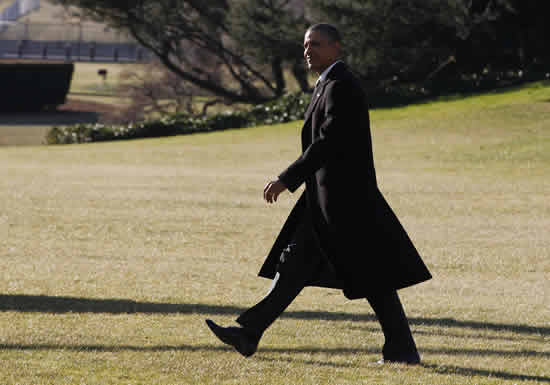Obama to Obama Jobs Council: I Disagree
J.D. Foster /
President Obama’s Council on Jobs and Competitiveness released its third report January 17 entitled “Road Map to Renewal,” a worthy description of serious issues affecting the American economy coupled with set of proposals that, with few exceptions, can best be described as pretty thin gruel.
The council—chaired by Jeffrey R. Immelt, the chairman and CEO of GE—was obviously constrained in many cases by political considerations imposed on it either by the Obama Administration or by itself as it recognized the political season.
However, this report will likely be best known for the quickness with which its own sponsor, President Obama, loudly “dissed” it, in the urban vernacular.
At least with Obama’s 2010 Simpson–Bowles deficit commission, the President waited a couple of months before embarrassingly ignoring the commission’s recommendations in toto. In the case of the Jobs Council report, the President set a new land speed record of about 24 hours before explicitly repudiating one of the council’s key recommendations.
The council’s report sensibly observes that the United States will need to “optimize all of its natural resources and construct pathways (pipelines, transmission and distribution) to deliver electricity and fuel.” One of the council’s reasonable recommendations from an earlier report was to “streamline environmental permitting” to expedite the review of infrastructure projects, such as transmission and distribution pipelines.
On January 18, the day after the release of the Jobs Council report, President Obama killed the Keystone XL pipeline that would have carried oil from Canada’s bounteous fields to waiting Gulf Coast refineries, creating tens of thousands of jobs now and greatly reducing the nation’s exposure to Middle East oil for decades to come. Now, thanks to Obama’s cowtowing to the environmental lobby, the Canadians will apparently build a pipeline to the Pacific Ocean to ship the oil to China for their economy to use. No doubt the Chinese will appreciate the magnanimous gesture, but it seems unlikely that the President’s council, not to mention America’s struggling workers, will do likewise.
The Keystone fiasco aside, one of the more curious elements of the council’s report is its emphasis on American manufacturing. A common perception is that America’s manufacturers are steadily and inexorably losing ground to foreign competition, a perception reinforced by the persistent reminder of foreign car brands on the nation’s highways and a steady decline in manufacturing employment. Fortunately, the perception is largely wrong.
It is certainly true that employment in manufacturing has fallen in recent decades. The council’s report observes that in 1980, manufacturing accounted for about 20 percent of American jobs, whereas the comparable figure today is about 9 percent. At the same time, manufacturing’s share of total production has remained roughly stable and, in fact, the United States and China are the only countries to have gained significant world share in manufacturing in recent years. The line that connects and explains these two dots of strong manufacturing and manufacturing job loss is the rapid increase in labor productivity, the result of innovation, and global competitive pressures.
With this strong performance in manufacturing, why, then, does the report suggest that we need to tilt the nation’s economic policy focus even more toward manufacturing? To be sure, as the report affirms, “Manufacturing matters.” But so, too, do health care services, financial services, and many other sectors. The extra emphasis placed on an apparently relatively healthy economic sector loudly smacks of an unjustified and unjustifiable policy bias and an unhealthy sense of government-knows-best industrial planning.
In other areas, the report includes a useful discussion of the role of federal regulations and “how best to strike a balance between competing public objectives” of job creation on the one hand and the need to achieve regulatory intent on the other. Unfortunately, the preponderance of the discussion and recommendations involve trying to rationalize the regulatory review process for new regulations, which are grains of sand compared to the massive mountain of existing regulations. The council’s focus should have been on how to clear away some of the mountain.
Only the third recommendation in the regulation discussion touches on the mountain, calling for a “retrospective review of rules and their impact,” directing the badly outgunned and undermanned Office of Independent Regulatory Analysis (OIRA) within the White House’s Office of Management and Budget to “provide guidance on how agencies should prioritize the review of rules and develop and implement a system for retrospective review in the future.” In effect, OIRA is to develop a plan for a system to devise a review of how to study what agencies might like to consider. That’s Washington-speak for “do nothing.”
The one really bright spot in the report is the call for tax reform, especially the need to simplify the corporate income tax and reduce the corporate income tax rate, which, as of April 1 (when Japan finally reduces its rate), will be the highest in the industrialized world at 39.2 percent. Unfortunately, the report is silent on the closely related issue of the need to reform the rest of the tax system, especially the taxation of non-corporate businesses, such as partnerships and sole proprietorships. It is unreasonable and implausible to imagine that the federal government could or would substantially simplify the tax system and cut the tax rate facing the largest businesses while leaving small and medium-sized businesses stuck with the old, complex system and high tax rates.
The Jobs Council has added useful ideas and recommendations to the nation’s policy menu. Many of these are quite modest in scope, and some are misguided or suggest an errant focus, but overall the council’s work has borne fruit. One can only hope that some of the better ideas from the council’s report receive a moment’s consideration in the White House before being squashed by President Obama, as with the Keystone decision.

